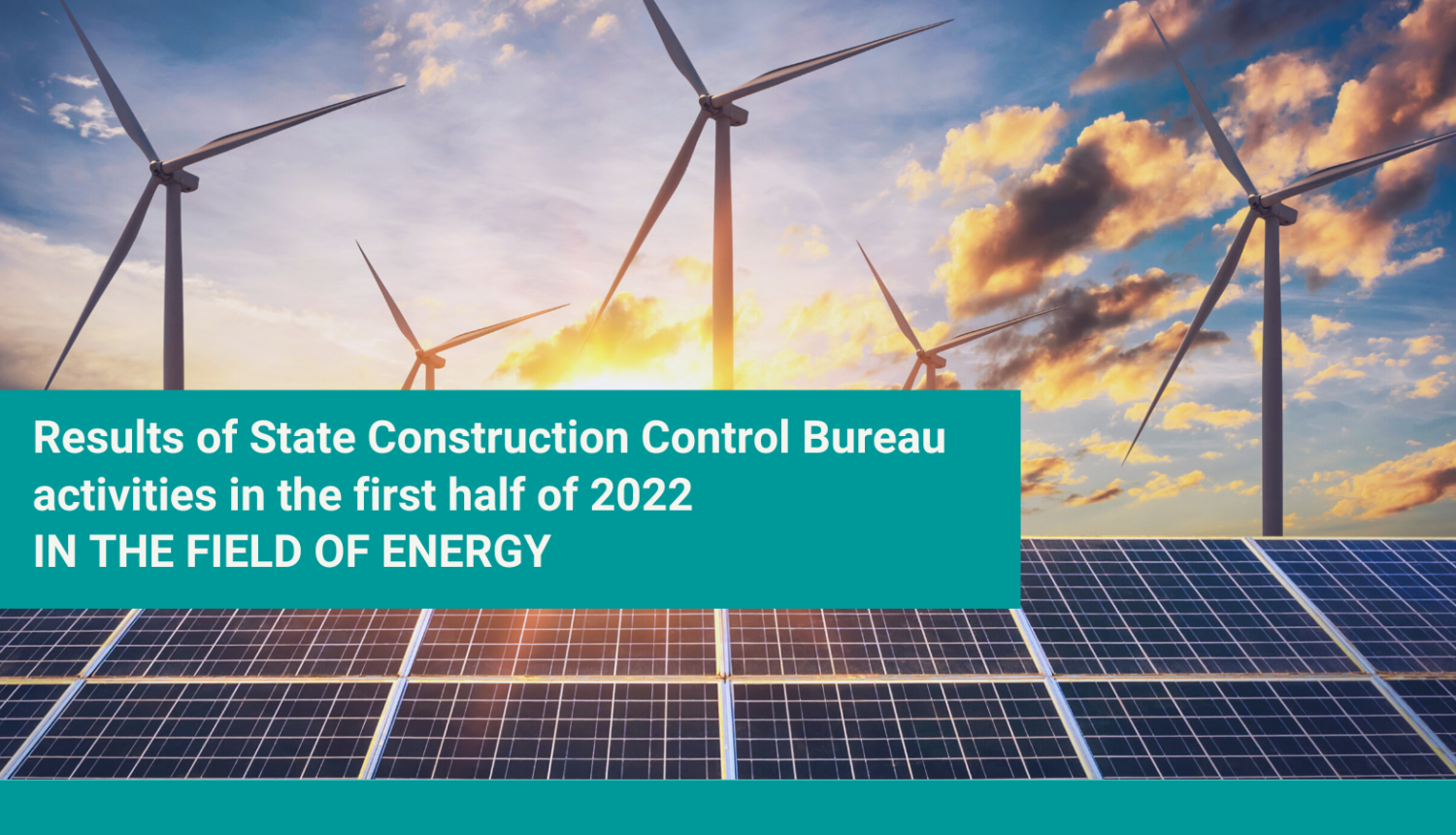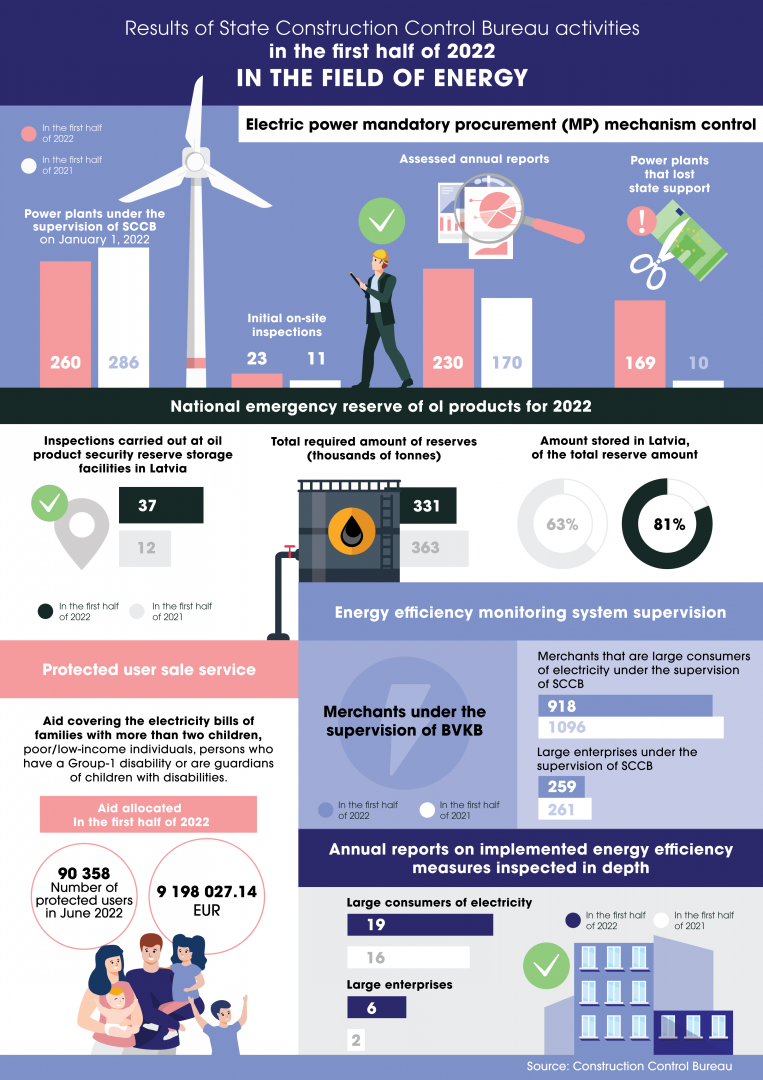In the first half of 2022, the Construction State Control Bureau (SCCB) continued its work supervising energy policy, improving and digitising the supervision of the implementation of the energy policy. With improvements in regulations and changes in the system for supervising and controlling electric power mandatory procurement (MP), the number of merchants receiving government assistance in the form of mandatory procurement of electricity decreased significantly.
Mandatory electric power procurement
In supervising and controlling the mechanism of electric power mandatory procurement (MP), SCCB conducts on-site and administrative inspections, and in the first half of 2022, SCCB assessed reports on the operation of power plants of 230 merchants who received government assistance in the form of MP in 2021. In addition, 23 on-site inspections of power stations took place, revealing that some of them had fuel, as well as generated electricity and heating energy metering devices that did not meet the requirements of laws and regulations. Correct heat energy records were not kept, and the electric capacity installed at the power stations did not match the capacity specified in the contract with SIA ‘Energijas publiskais tirgotājs’.
The assessment of the annual reports, on-site surveys, and tax payments by the merchants resulted in 32 warnings on the possible loss of MP rights.
In the first six months of the year, SCCB issued 169 decisions to revoke MP rights granted to merchants, which is significantly more than in the same period of last year, due to various deficiencies and violations found, as well as the merchants waiving their MP rights. Between the beginning of 2022 and 17 August, 188 decisions were adopted to cancel MP rights. Since 2020 and up to 17 August this year, SCCB issued a total of 256 decisions on the revocation of MP rights granted to merchants, including 74 revocations due to deficiencies and violations of regulations, and 182, due to merchants waiving their MP rights.
In the first half of 2022, SCCB required merchants to repay the public trader government assistance received illegally or without justification in the amount of EUR 571,152.37. Since 2020, 35 merchants have been ordered to return a total of EUR 4,605,522.65, of which EUR 1,920,714.86 has already been recovered. The recovery process continues. Some merchants still have time left to make the payment voluntarily, and some cases have been assigned for debt collection.
Since 1 January 2020, electric power producers that sell electricity as part of MP or receive a guaranteed payment for the electric capacity installed in a cogeneration plant pay a fee for the monitoring of their use of the government assistance provided to them for producing electricity. In the first half of 2022, EUR 230,378.42 was additionally received by the state as part of this fee.
As of 17 August 2022, 47 power plants were getting government assistance, including 17 biogas power plants, 10 biomass power plants, 2 natural gas cogeneration plants, 11 hydroelectric power plants, and 4 wind power plants, while 3 merchants were entitled to receive a guaranteed payment for the electric capacity installed in their cogeneration plant.
Energy efficiency
The management of energy efficiency issues has been within the competence of SCCB since 2020. Law requires large enterprises (LE) and large power consumers (LPC) to regularly conduct an energy audit, or to have a certified energy management system or a certified environmental management system with an extension. In 2022, SCCB monitors the energy efficiency of 1177 merchants, of which 259 are LE, and 918 are LPC. 94 merchants were included in the list of LE and LPC for the first time this year, and they will have to comply with the requirements of the law within the year.
If an LPC does not meet its obligations following the prescribed procedures and meeting the deadlines, that merchant is charged an energy efficiency fee. During the reporting period, 7 decisions to charge the energy efficiency fee were adopted, for a total amount of EUR 76,598.93.
SCCB conducts detailed on-site inspections of the merchants and municipal governments, with the aim of confirming that they fulfil their obligations. This year, SCCB conducted 25 detailed inspections, of which 6 took place at LE, and 19, at LPC. None of the inspections revealed any deficiencies.
Supervision of the oil product market
In late 2021, SCCB concluded contracts with 11 merchants on the creation of state oil product security reserves in order to enable the provision of state oil product security reserve services. The total amount of the reserves is 304 thousand tonnes. As of 2022, 81% of the country’s security reserves of oil products is stored in Latvia, with the rest kept in Lithuania and Sweden. In June this year, SCCB announced a new procurement for the provision of the security reserve service, to build state oil product reserves for 2023. The result of the procurement procedure will be known in early Q4 2022.
28 inspections of merchants that store the state oil product security reserve have taken place this year. As part of the inspections, SCCB checks not only the amount, but also the quality of the oil products stored.
As part of monitoring the quality of fuel in the first half of this year, SCCB took 163 fuel samples: 94 petrol (grades 95 and 98) and 69 diesel samples from 66 fuel stations all over Latvia. No deficiencies were found.
Assistance for traders of natural gas
The bureau provides assistance in the form of a reduction in the excise duty to merchants who sell natural gas as transport fuel. In the first half of 2022, SCCB adopted 15 decisions for 3 merchants, providing assistance in the amount of EUR 100,424.58, or 12,413,421 MWh.
Protected user service
The Protected User Data Information System (ALDIS) has been fully operational since 1 September 2021, managing the provision of government aid paying for electricity bills. As of the end of June 2022, the number of protected users was 90,358, of which 32,545 were families with more than two children, 36,020 poor/low-income individuals, and 21,793 people with a Group 1 disability or a disabled child. A total of more than EUR 9 million was allocated as aid to protected users during the reporting period. Currently, 2 electricity traders provide the protected user service - AS Latvenergo and SIA Tet.
Energy information systems
SCCB has continued the development of the energy information system, taking a significant step in the digitisation of the administration processes pertaining to energy efficiency. A new Energy Resource Information System was developed as part of the project ‘Digital transformation of the administrative procedures of the Ministry of Economics’, Agreement No. 2.2.1.1/21/I/006, co-funded by the European Regional Development Fund. The system saw its launch this year. Its purpose is to reduce the administrative burden on the members of the energy efficiency monitoring system, and to efficiently collect and analyse digitally submitted structured data. ERIS provides a working environment for more than 1000 entities operating in the energy efficiency monitoring system. In it, one can report on and track LE or LPC statuses, their fulfilment of obligations, and consumption of electricity. Soon, the system will also get a monitoring and control module for the state oil product security reserve, collecting information about the retail price of oil products, managing the fulfilment of the obligation to pay the state fee, and monitoring and controlling the transport energy market.




